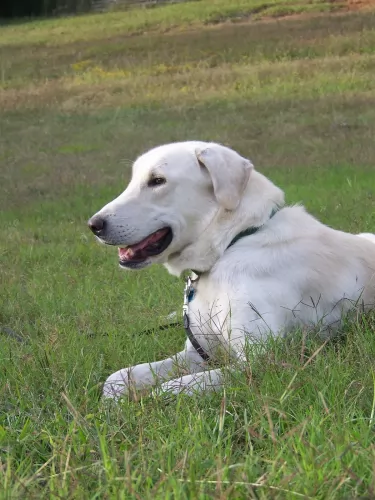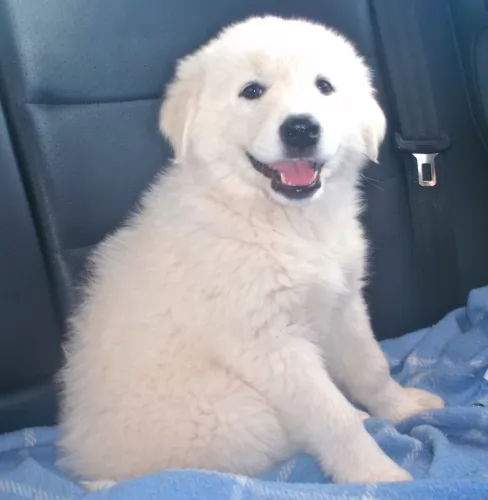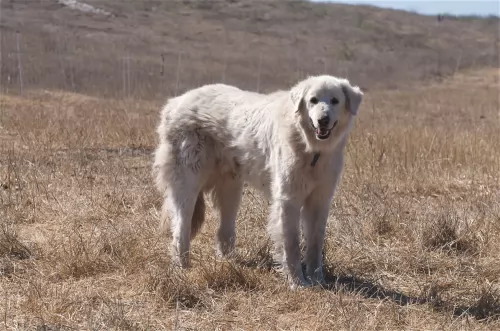 Petzlover
Petzlover Akbash Dog is originated from Turkey but Tsvetnaya Bolonka is originated from Russia. Akbash Dog may grow 57 cm / 23 inches higher than Tsvetnaya Bolonka. Akbash Dog may weigh 61 kg / 135 pounds more than Tsvetnaya Bolonka. Akbash Dog may live 5 years less than Tsvetnaya Bolonka. Akbash Dog may have more litter size than Tsvetnaya Bolonka. Both Akbash Dog and Tsvetnaya Bolonka requires Moderate Maintenance.
Akbash Dog is originated from Turkey but Tsvetnaya Bolonka is originated from Russia. Akbash Dog may grow 57 cm / 23 inches higher than Tsvetnaya Bolonka. Akbash Dog may weigh 61 kg / 135 pounds more than Tsvetnaya Bolonka. Akbash Dog may live 5 years less than Tsvetnaya Bolonka. Akbash Dog may have more litter size than Tsvetnaya Bolonka. Both Akbash Dog and Tsvetnaya Bolonka requires Moderate Maintenance.
 Akbash breed became popular in the 1970s. Around that period, Akbash was introduced to North America. There is archeological evidence that this breed was popular even in the 750-300 BC. Of course, it wasn’t the exact dog as we know it today, but there are many similarities between Akbash and dog from the ancient period. This breed was developed in Turkey to be a guardian dog. They were perfect flock guardians.
Akbash breed became popular in the 1970s. Around that period, Akbash was introduced to North America. There is archeological evidence that this breed was popular even in the 750-300 BC. Of course, it wasn’t the exact dog as we know it today, but there are many similarities between Akbash and dog from the ancient period. This breed was developed in Turkey to be a guardian dog. They were perfect flock guardians.
 It is believed that the dog’s ancestors are the Toy Poodle, Pekingnese, Bichon Frise and Shih Tzu. The Russian Tsvetnaya Bolonka has also become more well known since the British royal couple, Willam and Kate, have them as pets.
It is believed that the dog’s ancestors are the Toy Poodle, Pekingnese, Bichon Frise and Shih Tzu. The Russian Tsvetnaya Bolonka has also become more well known since the British royal couple, Willam and Kate, have them as pets.
 Weight of the Akbash dog variates from 41-64kg, while their height is 71-78cm. Female Akbash is smaller than a male Akbash, but not for much.
A lifespan of an average Akbash dog is 10-11 years, but if they have cared properly, they tend to live longer.
Litter Size of Akbash is 8-9 puppies.
Another Name for Akbash is Akbas Coban Kopegi, Coban Kopegi.
Weight of the Akbash dog variates from 41-64kg, while their height is 71-78cm. Female Akbash is smaller than a male Akbash, but not for much.
A lifespan of an average Akbash dog is 10-11 years, but if they have cared properly, they tend to live longer.
Litter Size of Akbash is 8-9 puppies.
Another Name for Akbash is Akbas Coban Kopegi, Coban Kopegi.
 The Tsvetnaya Bolonka is a small dog standing at 22 – 27cm in height and weighing between 2 and 4kg. He has been developed to be a companion dog.
The Tsvetnaya Bolonka is a small dog standing at 22 – 27cm in height and weighing between 2 and 4kg. He has been developed to be a companion dog.
The long coat of the dog is wavy or curly and is a grey color, brown, red, white or black. The males have a beard and mustache.
Allergy sufferers appreciate that the dog doesn’t shed but the coat will need to be brushed to prevent matting. The ears are medium length and the tail curls up over the back.
These dogs are sturdy, happy, social, playful little dogs with a loving, loyal temperament. They’re balls of fun and make super playmates of disciplined children who have been taught to be kind and gentle with animals.
They are well balanced, amicable dogs with a streak of independence. They’re intelligent too and will respond well to training and socialization.
He isn’t aggressive and isn’t a yapper either. He is a friendly dog, even with strangers but he can still prove to be a good watchdog. Small and compact, he can do well in the countryside or the city.
 Have in mind that Akbash is a large and powerful dog. They are bred through generations to be guardians and suspicious. They are very independent because they tend to make their own decisions while guarding flocks. They will require adequate socialization, but overall, they are very intelligent and they tend to learn quickly. It requires time and patience, but are great pets for right owners. Akbash has a white to biscuit color coat. They also have a dark pigment around nose, eyes, and mouth. Akbash is very quick and agile dog, which might be surprised because of its size.
Have in mind that Akbash is a large and powerful dog. They are bred through generations to be guardians and suspicious. They are very independent because they tend to make their own decisions while guarding flocks. They will require adequate socialization, but overall, they are very intelligent and they tend to learn quickly. It requires time and patience, but are great pets for right owners. Akbash has a white to biscuit color coat. They also have a dark pigment around nose, eyes, and mouth. Akbash is very quick and agile dog, which might be surprised because of its size.
It is important to train them since the puppyhood. They are working dogs and they will be happy when they have tasks during training. Due to their independence, consistent and steady training is important. An old-fashioned way of training that includes punishment is not recommendable. Positive training with awards is the best way to train your Akbash dog. They do not require a lot of daily exercises. Daily walks would do more than enough. Younger dogs need more exercise than more mature ones. They can be very good for other animals, but they have to be socialized with them. It is the best way to socialize your dog when it is still a puppy.
 The Tsvetnaya Bolonka is a true companion being even-tempered, intelligent and friendly. He has been specifically developed as a companion dog whether you live in the city or the countryside.
The Tsvetnaya Bolonka is a true companion being even-tempered, intelligent and friendly. He has been specifically developed as a companion dog whether you live in the city or the countryside.
He gets on well with children and with other pets in the home and even towards strangers. Just remember that wherever you choose to live with your sweet little pet, he will still need regular exercise to remain the feisty, happy little dog he is.
 This breed may get some of the typical small-dog health conditions. These can be things such as dental problems, obesity and Patellar Luxation.
This breed may get some of the typical small-dog health conditions. These can be things such as dental problems, obesity and Patellar Luxation.
Small dogs often have problems with their knees, and patellar luxation is a common orthopedic condition for small dogs. You’ll see your dog walking on 3 legs.
A luxated kneecap can move out of place, but in some more serious instances, it can dislocate completely. Treatment will require a visit to the vet. Sometimes surgery is required.
Small dogs are more prone to dental disease than large dogs. Tartar and plaque form, there is gum recession, and loss of teeth is common with these little dogs.
Check inside his mouth regularly. Brushing the teeth can be of value to the dog and you get special canine dog and toothpaste. A tooth infection can be serious for your pet and cause him to have toxins circulating in the bloodstream that can make him sick.
 Akbash dog is very easy to care. They can stay fit on a minimum amount of food. 2-2.5 cups divided into two meals would be ideal for your dog. They require meat, so giving them dry industrial food can be a solid substitute. Vegetables and oil can also be included in meals. It will keep your dog healthy and happy.
Akbash dog is very easy to care. They can stay fit on a minimum amount of food. 2-2.5 cups divided into two meals would be ideal for your dog. They require meat, so giving them dry industrial food can be a solid substitute. Vegetables and oil can also be included in meals. It will keep your dog healthy and happy.
Puppies have to eat more meals per day. It is the best to give your puppy Akbash 3-5 meals per day. Those meals should be divided into smaller portions. It is recommended to give your puppy all necessary vitamins and minerals that include calcium for stronger bones. It will improve the overall health of your dog, and it will help it develop into a healthy adult dog.
Akbash will request some grooming, but they are not very difficult to groom. They require regular grooming. Every few days will be enough, except when they are shedding. Akbash will need daily grooming when shed. You can bath your pet occasionally, but not very often. Bathing, if necessary, should be done only 5-6 times a year. There is no need for more.
 These little dogs will need a walk each day. They also love all sorts of games both indoors and outside.
These little dogs will need a walk each day. They also love all sorts of games both indoors and outside.
Brush the hair regularly to avoid matting. Many people tie the hair around the face into a ponytail. If the hair becomes dirty, it can be gently shampooed with a mild, natural shampoo and conditioned. The wet hair will require a wide-tooth comb to comb the hair.
Feed your dog the best dry kibble that there is. Check the packaging and make sure the ingredients are the best, full of vitamins and minerals. Try to give him some tasty home-made food such as boiled chicken, brown rice and vegetables. Remember to chop it up very finely. Never give your dog foods such as chocolate, popcorn, peanuts, and spicy food. It can upset his stomach. Make sure he has constant access to fresh, cool water.
Get your little pet to the vet if he shows signs of illness and make sure his vaccines are up to date to avoid deadly canine illnesses.